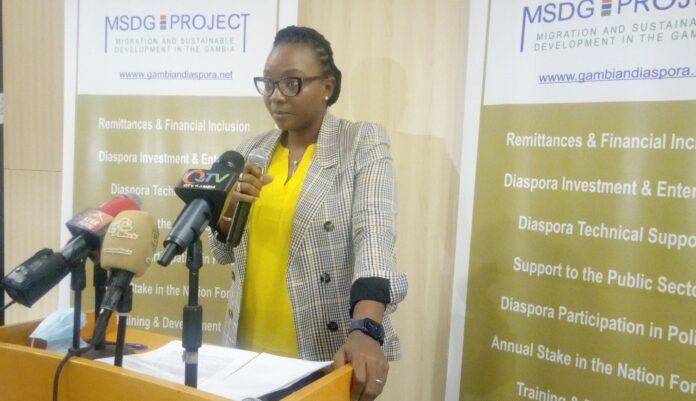By Ndey Sowe
Professor Amina Sillah, from Towson University in Maryland, USA in representing the diaspora on the fifth Stake in the Nation Forum (SNF), stressed that the diaspora should be considered not just a source of financing but as partners.
“The diaspora should be considered not just a source of financing but as partners,” she stressed. “Partnership is a two-way street, too often, we have felt that the government sees us as only ‘Cash Cows’.”
She said diaspora still often lack a voice to speak on their collective objective due to trust issues, lack of policy coordination and implementation, limited human and financial capacity and low digital information services.
She noted that this has to change.
The diaspora population has grown and so has their savings and the scale of resources available to re-invest. However, she said limited progress has been made in attracting this savings.
She said: “We must offer the necessary framework to maximize this investment potential. No magic formula exists to help maximize diaspora investments in the Gambia and I don’t think right now we can come up with one as I stand here.”
She stated that the government can work with diaspora to help overcome some of these constraints that inhibits development such as lack of investments and international business, lack of investments, lack of technical and professional skills, and isolation from global networks and exclusion from global supply chains among others.
“There is the notion that diaspora and their contributions have been largely ignored or side lined in the development sector of the Gambia”, she stressed, adding there should be a clear way to contribute.
“The diaspora motivation to contribute should also be understood,” she emphasized.
Our policies relating to diaspora engagement should be developed in line with our national development policies. Our NDP has been developing for a while now and it is important the diaspora engagement policies build on existing policies and not embed them within the NDP.
She instead said this will avoid duplications and overlaps.
She noted that the Gambian diaspora is approximately one hundred and forty-thousand (140), and has grown over the years, diversified and a fundamental player in the political, social, economic and cultural fabric of the development of the Gambia.
“Presently, there are more than two hundred and fifteen million people around the world who live outside of countries they call home including myself,” she said, adding that some of them are lucky to have left for better opportunities while others are forced to live to escape economic hardships.
She added that when there is greater need at home, Gambian send significantly more remittances to help their families.
“The flow of capital from the diaspora should be seen as the most tangible element of the nexus between migration and development,” she stressed.
She also recognises the unique opportunities and highlights some of the challenges confronting the diaspora community.
She remarked: “The role of the Gambian diaspora goes far beyond remittances and meeting short term needs, they also play a very important role in long term development. Gambians contribute many pertinent in meaningful ways including technology transfer.”
Meanwhile she said most of the new technology industries in the country are owned by Gambians who have returned home.
“We also have institutional linkages, myself included, I have connections with the University of the Gambia with my University linkages for example, by contributing to the design of educational curriculum and training. Diaspora can raise the quality of education in the Gambia and they can also directly provide rigorous professional development and leadership training programmes,” she highlighted.
She said there is huge benefit to maximise as a result of positive impact diaspora has on creating jobs and income through financial investments as well as socio capital and network of the diaspora.
To fully reach these potentials she added, it is key to have a conductive legal framework in place, where the skills and knowledge of the diaspora can be converted into global opportunities that help raise funds, increase efficiency and expand Gambia’s market scale.
In the same vein, she noted that they can also be powerful advisers to the government in helping to improve the quality of public institutions and advocates of foreign businesses looking to expand in the Gambia.
“The diaspora is a natural connector of bridge builders that connects the Gambia to the rest of the world due to their trans-national nature and we must find a way to build on this and strengthen what the diaspora is already doing,” she emphasised.




















